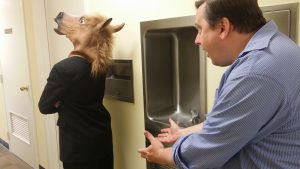
Photo by Gerberkun courtesy of Imgur.
In my experience, you can lead an educator to technology however, you can not make them prep.
Technology is most certainly not a “vitamin” that can be consumed with the expectation that benefits will passively and spontaneously appear. I very much align myself with Dede’s view on technology’s purpose within classrooms: “…emerging interactive media are tools in service of richer curricula, enhanced pedagogies, more effective organization structures, stronger links between schools and society, and the empowerment of disenfranchised learners.” (Kozma, 2003)
Designers of technology enhanced learning experiences are best served by staying true to their core pedagogical beliefs. As individual learners are unique, so are educators. My strengths as an educator will differ from my colleagues, therefore the technology that I utilize may also look different. In math and science, I believe that the best way to utilize technology is to focus on three questions:
- How can I bring science or math into my classroom in ways that I otherwise could not?
- How can technology be used to maximize social learning interactions (student-teacher or student-student)?
- How can technology be used to increase engagement, curiosity, and overall excitement to learn?
Hi Dana, I’m wondering what you think about the idea of how educators’ core pedagogical beliefs can occasionally impede their abilities to design technology enhanced learning environments?
Hi Gloria,
What a great question to ask! I have always maintained that it is critical to not only be yourself as an educator, but to continually evolve your practice so that what you do in the classroom becomes even better. Adapting to technological and pedagogical shifts in education is a key component for someone like myself (and pretty much anyone in MET, I’m assuming). That being said, I do not think that utilizing Web 2.0 methodologies is the only way to go about being an effective educator. If that was the case, then I would not be able to look back at ANY of my role models in education and be able to say that they were effective. For example, my Grade 12 History teacher was nationally recognized for teaching excellence before he retired. In his last five years of teaching, 80%+ of the Graduating class took History 12. Many students took his course in Grade 11 with the intent of taking it a second time in Grade 12— not to get a higher mark, but to merely be in this man’s presence for another 5 months. His only “technology” was a podium, a piece of chalk and a film projector. What made him particularly effective was that he was a master story teller and he challenged students thinking, class after class. My point is that whether or not technology is involved, individual teachers will impede themselves or not impede themselves from being the best possible version of themselves. As Dede states in the Kozma forward, technology is not a vitamin to be consumed. For that matter, nor is Inquiry Learning… If educators are going to adopt TELEs, Inquiry/Project-based Learning, next-new-education-fad, etc., it needs to be done well and with purpose. To quote Einstein, “Everybody is a genius. But if you judge a fish by its ability to climb a tree, it will live its whole life believing that it is stupid.” Personally, I don’t care if my colleagues use technology or don’t— my expectation for everyone is just to do what they do, do it as well as possible, and make it better the next time. Thanks for your question!!!! ~Dana
Dana, I have to tell you that I really enjoy your open, honest writing style. I was reading some of the posts on your e-folio this weekend and you have a wonderful way of writing so that you engage your reader and connect them to you (at least I feel that you do). As far as this post goes, I loved your opening line – I actually laughed out loud when I read it, so thank you for that 🙂
I enjoyed reading your post and the questions that you posed. As you have pointed out, it is important to consider our own unique strengths as educators. I also agree with your point that we need to stay true to our pedagogical beliefs. I really struggled to use technology in my classroom prior to enrolling in the MET program because many of the popular digital technologies did not fit into my belief of what education should look like. A year and a half into the program, my pedagogical beliefs have shifted (and are continuing to develop) to include digital technology integration. In the past, I did not understand how to effectively integrate technology, but now I can not only integrate it, but I also have the research to back up that integration for anyone who is interested in hearing about it.
Hi Mary, Thank you so much for your wonderful words. I think I write posts more conversationally to compensate for the lack of face-to-face in our worlds— at least in my world it seems as though the face I am in front of the most these days is my computer screen! I am with you completely when it comes to how MET has influenced my approach. Entering MET, I was just a gadget enthusiast, but now I am designing lessons with research beneath me wings! …does anyone else hear Bette Midler in the background right now? :), Dana